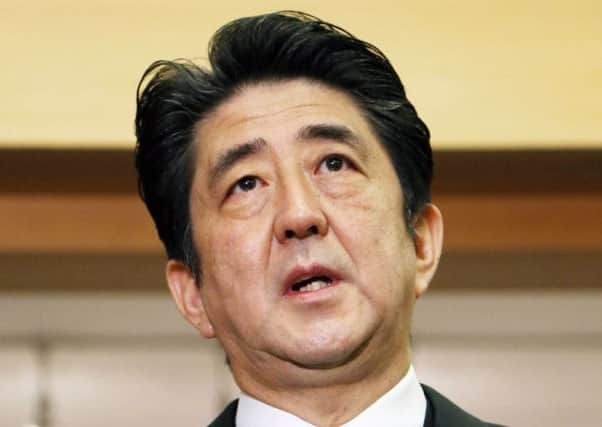China furious after Japan PM war shrine visit


The visit to the Yasukuni shrine, which honours Japan’s 2.5 million war dead including convicted war criminals, appears to be a departure from Mr Abe’s “pragmatic” approach to foreign policy, in which he tried to avoid alienating neighbours.
The Japanese invasion of Manchuria is estimated to have cost the lives of at least 20 million Chinese.
Advertisement
Hide AdAdvertisement
Hide AdIt was the first visit by a sitting Japanese premier since Junichiro Koizumi went there to mark the end of the Second World War in 2006.
Visits to Yasukuni by Japanese politicians have long been a point of friction with China and South Korea, because of Japan’s brutal aggression before and during the Second World War.
Mr Abe, wearing a formal black jacket with tails and striped, grey trousers, spent about 15 minutes at the Shinto shrine in central Tokyo. Television cameras followed him inside the shrine’s precincts, but were not allowed in the inner shrine where he paid respects to the war dead.
“I prayed to pay respect for the war dead who sacrificed their precious lives and hoped that they rest in peace,” he told waiting reporters afterward.
He said criticism that Yasukuni visits were an act of worshipping war criminals was based on a misunderstanding. “Unfortunately, a Yasukuni visit has largely turned into a political and diplomatic issue,” he said. “I have no intention to neglect the feelings of the people in China and South Korea.”
Chinese foreign ministry spokesman Qin Gang issued a strong rebuke in a statement posted on the ministry’s website.
“We strongly protest and seriously condemn the Japanese leader’s acts,” Mr Qin said.
He called visits to Yasukuni “an effort to glorify the Japanese militaristic history of external invasion and colonial rule… and to challenge the outcome of the Second World War.”
Advertisement
Hide AdAdvertisement
Hide AdHe added: “Japanese leaders are not only showing no moderation but have doubled their efforts and created a serious incident on historical issues. This poses a major political obstacle in the improvement of bilateral relations. Japan must take responsibility for all the consequences that this creates.”
Yesterday’s visit came on the first anniversary of Mr Abe’s taking office as prime minister. Mr Abe, who had visited previously when he was not premier, had expressed extreme regret over his decision not to visit Yasukuni during an earlier one-year term in office in 2006-07.
“It’s been one year since I took office and I chose this day to come here and report to the spirits about the progress over the past year and to renew my commitment to peace so that we will never cause anyone to suffer in war,” he said.
Adding to the unease of Japan’s neighbours is Mr Abe’s support for revising Japan’s pacifist constitution and expanding the military to counter rising tensions over uninhabited islands in the East China Sea claimed by both Japan and China. Sino-Japanese ties chilled even further after China last month announced a new air defence identification zone that included airspace over the disputed islands.
China has criticised Japan’s plans unveiled earlier this month to boost defence spending, buying early warning planes, beach assault vehicles and troop-carrying aircraft while seeking closer ties with Asian partners to counter a more militarily assertive China.
Mr Abe has been active on the diplomatic front during his one year in office, but has not held summits with either Chinese or South Korean leaders.
HATEFUL HISTORY
JAPAN invaded Manchuria on 19 September 1931, and continued to attempt to expand through a series of provocations, despite a truce being declared in February 1932.
On the 7 July, 1937, Japan went to war against the then Republican government of China. The war would see some of the worst excesses of the wider Second World War, with Chinese sources estimating the loss of 20 million dead and 15 million wounded. Japan lost a million soldiers and 1.7 million wounded. Targeting of civilians was common Japanese practice from the outset. In May 1942, for instance, General Yasuji Okamura launched his “Three Alls Policy” – kill all, loot all, burn all – which alone resulted in the killing of an estimated 2.7 million Chinese civilians.